A regional meeting scheduled on May 29, 2015, in Bangkok must find solutions to the so-called boat people exodus.
Rohingya explained to Human Rights Watch how they endured two months at sea, packed below decks in cramped conditions with limited food and water and very poor sanitation.
Boats carrying approximately 100 mostly Rohingya men and women each abandoned passengers at an undisclosed location along Thailand's coast, leaving them to fend for themselves until they were found by the Thai authorities.
According to international agencies, 3000 to 4000 people may still be aboard ships at sea.
''Survivors describe how they flee persecution in Burma only to fall into the hands of traffickers and extortionists, in many cases witnessing deaths and suffering abuse and hunger,'' said Brad Adams, Asia director at Human Rights Watch.
''Interviews with officials and others make clear that these brutal networks, with the complicity of government officials in Burma, Bangladesh, Thailand, and Malaysia, profit from the desperation and misery of some of the world's most persecuted and neglected people.''
Regional states and other governments with the ability should make commitments to redouble search-and-rescue efforts and ensure that thousands of Rohingya and Bangladeshi asylum seekers and migrants have full access to procedures for seeking international protection and humanitarian assistance, Human Rights Watch said.
''Burma and Bangladesh need to stop persecuting Rohingya, while Thailand and Malaysia urgently need to shut down camps where boat people are held to end abuses and ensure that no more mass graves are created on their soil,'' Adams said.
In recent weeks scores of boats carrying thousands of Rohingya asylum seekers and migrants from Burma and Bangladesh have arrived in Thailand, Malaysia, and Indonesia.
The three governments responded by pushing the boats back out to sea, leading to domestic and international condemnation and forcing them to reconsider these policies. In response to pressure, the foreign ministers of the three countries met in Kuala Lumpur on May 21.
Malaysia and Indonesia agreed to permit boats to land, but only with the proviso that the international community provide humanitarian assistance and help resettle or repatriate all the passengers within one year.
Conditions for Rohingya in Burma are extremely dire, with limited access to education, employment, and the freedom to travel or observe their own religion cited as reasons for flight.
Some flee voluntarily to escape these abusive conditions, but Rohingya also told Human Rights Watch that in some cases, smugglers lured and duped people to make the sea journey without disclosing what was involved, and sometimes handed them over to traffickers.
One 13-year-old Rohingya girl told Human Rights Watch how men grabbed her in front of her family: ''They dragged me to the boat, they had sticks, and threatened to beat me.
''I screamed, I cried loudly. My parents were weeping, but they couldn't do anything.''
Another 16-year-old Rohingya girl said:
''There was a group of six men, they were Rakhine Buddhists from Bangladesh, they had knives and guns.
''They forced me to get on a boat, they told me I was leaving Myanmar [Burma]. They pushed me to the small boat,
''I fell into the water up to my shoulders. Fifteen other Rohingya were on that boat. All the people were forced onto the boat.''
A third Rohingya told of being grabbed by traffickers along with her husband and child: ''I was on the way to my father-in-law's house with my husband when a broker and many men took us.
''They forced us onto the big boat. On the boat I couldn't understand their [the traffickers'] language, I cannot speak Burmese or Rakhine, I don't know who they are.''
In all instances, the conditions on the boats were terrible. One Rohingya girl told Human Rights Watch:
''We spent two months on that boat, more people kept coming to the big boat, small boats all the time. We [the women] were under the boat, it was so small.
''I couldn't see outside the boat, just feel it go up and down. People were throwing up, I felt dizzy and uncomfortable the whole time.''
Another Rohingya said: ''When I got to the big boat - I cannot explain my feeling I was so scared. We were about 16 people in one small room.
''The doors were always locked. The smugglers put the food and water through a small hole, we never saw them.''
The abuses continued on land.
On May 25, Malaysian government authorities announced they had discovered as many as 139 similar graves in a series of 28 camps on the Malaysian side of the border.
This followed the discovery of mass graves in Thailand in May. Thailand and Malaysia need to act immediately to close any remaining camps of victims and offer aid and protection to any survivors found.
Rohingya and Bangladeshis described how they have been held in camps in Thailand and Malaysia until they could pay a ransom.
They were beaten and abused if they could not pay.
One Rohingya woman who was held in such a camp on the Thai side of the border told Human Rights Watch that she was severely abused to force her relatives to pay up: ''The brokers beat me with sticks and bamboo and put out cigarettes on my legs and ankles because I could not raise the money.''
The current crisis was in part sparked after the discovery of mass graves of people suspected to be Rohingya and Bangladeshi. Pretending that the government did not know that Rohingya and others were regularly trafficked and smuggled to camps in Thailand on their way to Malaysia, the Thai authorities began a crackdown on transit camps on May 1.
The poor treatment of the Rohingya has been accompanied by callous remarks by regional leaders. Burma's political leaders deny the existence of Rohingya, denouncing them as ''illegal Bengalis.''
Burmese officials initially denied any of the people in the boats came from Burma. Prime Minister Sheikh Hasina of Bangladesh said the migrant workers from her country were ''mentally sick'' and vowed to punish anyone leaving the country illegally.
Prime Minister Tony Abbot of Australia called the boat people ''reckless'' and when asked if Australia would consider resettling any Rohingya found to be refugees, replied, ''Nope, nope, nope.''
Ahead of the regional meeting on 'Irregular Migration in the Indian Ocean' convened by the Thai government on May 29 in Bangkok, the leaders of Burma, Bangladesh, Thailand, Malaysia, and Indonesia should show greater recognition of and respect for the rights of the Rohingyas and Bangladeshis on these boats.
The United Nations refugee agency, UNHCR, and other international agencies should be permitted access to survivors of boat voyages to assess their claims for protection in accordance with international standards and to help identify people who are fleeing persecution, those who were trafficked, and those who are migrating for economic reasons.
Burma and Bangladesh should hold to account anyone found to be abusing Rohingya and others by coercing them or deliberately deceiving them to embark onto boats, where they are held in atrocious conditions.
''Thailand, Malaysia, and Indonesia need to agree to never again engage in pushbacks of people stuck at sea, find any remaining boats, bring the people on board to safe ports, and ensure that their rights are respected,'' Adams said.
''Just as important, there will be no long-term solution unless Burma ends its rights-abusing and discriminatory policies toward the Rohingya and joins other countries in taking action against smugglers and traffickers who abuse and prey on them.''
REPORTERS ON THE RUN
Phuketwan journalists Alan Morison and Chutima Sidasathian will be in Bangkok for the Special Meeting on Irregular Migration in the Indian Ocean and available on the sidelines for interviews about the precedent-setting military versus media criminal defamation case brought against them by the Royal Thai Navy.
''As long as the Royal Thai Navy pursues these false charges, reporters and editors in Thailand and around the world cannot and will not accept the military government's word that it understands the universal principles of media freedom and democracy,'' says Morison.
Morison and Khun Chutima are obliged to begin serious preparations for their July trial from Monday, June 1. Please call Khun Chutima (''Oi'') on 089 4725117 to arrange an interview sometime between 2pm Thursday and noon Saturday.


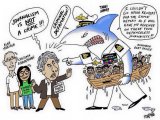
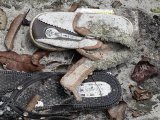
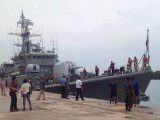


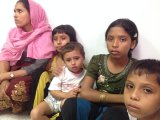

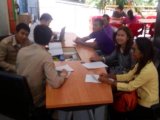



Are all these horrible happenings going to play a role as well in the PW journalists court case in July 2015?
Posted by Kurt on May 27, 2015 08:36
Editor Comment:
We believe the Phuket court will see what Rohingya and Muslim citizens of Thailand and the rest of the world look like, yes.